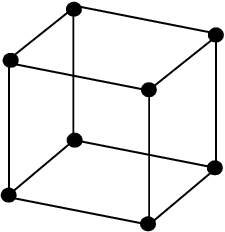Publication date: 06/27/2024
Full Factorial Designs
A full factorial design defines an experiment where trials are run at all possible combinations of factor settings. A full factorial design allows the estimation of all possible interactions. Full factorial designs are large compared to screening designs, and since high-level interactions are often not active, they can be inefficient. They are typically used when you have a small number of factors and levels and want information about all possible interactions. For example, full factorial designs often form the basis for a measurement systems analysis (MSA).
Figure 13.1 Full Factorial Design for Three Two-Level Factors
Contents
Overview of Full Factorial Design
Example of a Full Factorial Design
Example of Analyzing a Full Factorial Design
Build a Full Factorial Design
Responses
Factors
Output Options
Make Table
Full Factorial Design Options
Want more information? Have questions? Get answers in the JMP User Community (community.jmp.com).
